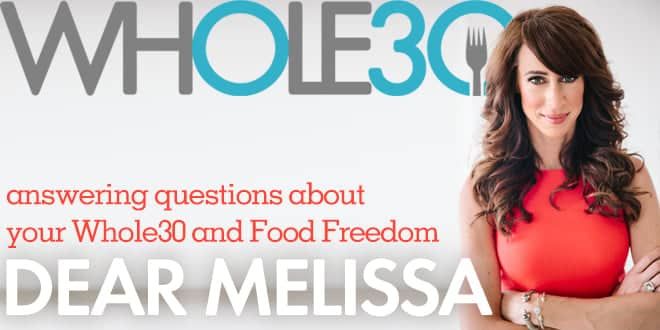You’re reading a Dear Melissa Replay, where we re-post some of the most popular entries in Melissa Hartwig’s regular Whole30 advice column. Dear Melissa addresses your questions and concerns about transitioning into or completing a Whole30, successfully sticking to your new Food Freedom habits, and figuring out how to make this lifestyle work in the real world.
Dear Melissa,
I have had myriad scale and non-scale victories with the Whole30, mostly because of how it has changed my relationship with food. One thing that sticks in my craw, however… Lots of folks see my changes in body composition and they always say, “Oh, you’re a guy, weight just drops off you boys.”
Did I mention that I am of the male persuasion?
It seems to me that I am focusing and being really kind to my body by choosing the most nutritionally dense food around. It’s not easy. Is there anything to this sexist statement that it’s easier for us guys? –Josh B., Charlotte, NC
Dear Josh,
First, I’m so happy that you are of the male persuasion, because men rarely write in for advice, even though I know you guys struggle just as much as women do with your Whole30 experiences. Yes, you do, you just don’t talk about it as freely. So thank you for voicing a concern that I guarantee tons of men doing (and having done) the Whole30 have considered or experienced.
Now, let’s get to your questions. First, is there anything to this whole “guys lose weight easier than women” assumption? Maybe, especially in the short-term.
First, recent studies show that men actually do have an easier time losing weight with concerted diet and exercise efforts than women… at least, in the short term. You can thank your higher testosterone levels and muscle mass for that. However, this doesn’t hold true for longer weight loss efforts. One 2014 publication out of England showed that by around the 6-month mark, weight loss was pretty even for men and women. On a short-term program like the Whole30, however, you may see men losing body fat faster and easier.
In addition, your food habits and cravings may play a role. Some studies show women crave less healthy foods more than men, and have more negative feelings associated with these cravings (and subsequent givings-in). These negative feelings may promote stress, which only promotes more cravings and more givings-in, which (combined with serious caloric or carbohydrate restriction) would only promote more stress, negative feelings, cravings, and givings-in.
We’re not even going to talk about PMS.
Finally, as women’s fat stores are more spread out than a man’s, a 5 pound weight loss may be far less noticeable on your spouse than it is on you (who tends to lose weight in the midsection first), leading others to believe you can effectively trim up your oh-so-visible belly with a snap of the fingers.
So, maybe there’s a reason people think it’s easier for you guys to lose weight. But, look around. Is it really that easy? If it was, all you dudes would be lean and trim (or maybe a happy 10 pounds overweight, because beer). And that’s certainly not the case. According to the U.S. Department of Health and Human Services, 74% of men in the U.S. are classified as overweight or obese (and 36% fall into the obese category).
So it ain’t that easy for you.
Now, let’s get to the heart of the question, which applies to both men and women: how do you tactfully address the fact that people assume you’ve taken on the Whole30 with the sole intention of losing weight? (This assumption is especially hard to combat if you have, in fact, lost weight with your program.) Your response to their questions or statements depends on how well you know them, and how much you want to share.
Level 1: Stranger or casual acquaintance
This is your grocery store clerk checking out your fresh veggies, that guy Bart (or is it Burt?) from accounting who remembers you mentioned the Whole30 at your last staff meeting, or your airplane neighbor noticing you’re reading It Starts With Food. They’ll say something like, “How much weight have you lost?” or “How’s your weight loss going?” They mean no harm. They don’t know you, and it’s a pretty easy jump to make; new diet = weight loss.
Create a canned answer for these folks—something that doesn’t require you to explain more than you choose. Try, “I feel so good I haven’t even stepped on the scale!” or “I’m not doing this for weight loss, but thanks for noticing I’m looking healthier.” That’ll likely be the end of that, but if it’s not, feel free to share more about the Whole30. Explain a little bit about the program (“It’s a 30-day reset for your health, your habits, and your relationship with food, and I am loving it!”), then send them to the website or to The Whole30 for more information.
Level 2: Friends or family
These people are your gym buddies, your church group, the co-workers you have lunch with every day, or your Aunt Mary. They know you and some of your history with food, your health, and your weight. They’ve likely watched you make efforts to change all of those factors in the past. You may have shared some of your struggles with them, but not spilled your emotional guts.
They may be more cautious about this “new diet” of yours if they’ve watched you go through every fad or quick fix in the last five years. They may also be a little defensive, jealous, or unsupportive if your Whole30 experience is moving you further away from them in any capacity. This is where you may catch people saying, “New diet? It’s so much easier for guys to lose weight,” or “How much have you lost on this one?”
This is where you open up a little, and share more of your own personal reasons for doing the Whole30. These people do care about you, and maybe they’re a little worried about your state of mind, that you’ll be disappointed if you fall back into old habits (like other diets you may have tried.) Try something like, “Actually, this one is different. It’s a 30-day health-focused approach. I took it on to XXX (fill in your personal reasons here). So far, I’ve experienced XXX (fill in results here). If I’ve lost any weight, it’s just a bonus—I’m eating as much food as I want, and not cutting or restricting calories. It’s actually pretty awesome.”
Then, follow the same approach: if they seem interested or want more information, send them to us, or share more about why you took the program on, your day-to-day (like what you eat for breakfast or how you manage travel), and what you’ve experienced so far.
Level 3: Your People
These are those closest to you—your immediate family, your best friends, your trusted confidantes. These folks have seen your highs and lows, at your best and worst. You have a more complicated relationship with them, and may find it (strangely enough) scarier or more intimidating to talk to them about big, important life stuff than you do your more casual friends or acquaintances.
Plus, they know all of your secrets. They know you swore you’d never diet again, they heard you call the Whole30 “stupid” or a “fad” a year ago (before you knew any better, or before you were ready), they’ve seen you sad, stressed, or bored and eating candy/cookies/pizza, and yes, you know men do this too.
They may be worried about this new “crazy” diet you’re on, or scared that when this one fails (as the rest of them have), that you’ll be thrown back into a funk of negative self-talk. These are the people who need to hear, from your heart, as honestly as you are able to share, what’s been happening in your life as a result of the Whole30.
It might sound something like this: “The week before the Whole30, I found myself eating the tops off cupcakes while in bed watching Game of Thrones. This was not okay with me, but I knew another calorie-cutting weight loss diet wasn’t the answer. I did some research and found the Whole30. It focuses so much on changing your relationship with food—and I don’t talk about it much, but I knew that was something I had to change.”
If this doesn’t sound like typical “man talk,” good. You’re trying to bust stereotypes here—namely, that eating cupcakes in bed is chick territory, and men just need to “buckle down a little” to get their six-pack back. Share your struggles, your rationale for taking on the program, and most important, what’s changed for you since your Whole30 began. Try to find common ground—if you know your Mom also struggles with late-night binges, talk about how those are now a thing of the past. If your best friend has mentioned a few times how he hates to see you so bummed out about your weight, talk about how you find the “no scale” rule so freeing, and how your self-confidence is actually up now that you’re taking such good care of yourself.
If they mention weight loss, be honest here. There’s no shame in saying, “I’ve lost 15 pounds so far, and I’m really proud of that.” But explain that you’ve lost weight only as a byproduct of your new, healthy habits; that weight loss isn’t your goal; and that you’re really focused on getting healthier as a result of the sustainable lifestyle changes you’ve made thanks to the program.
With you leading by example, it’s hard to imagine those closest to you won’t be interested—and here’s your opportunity to share with them all of the amazing things you’ve experienced through your own Whole30 program. Offer to do another 30 days with them, walk them through the program, be their phone-a-friend for difficult days, or cook them a Whole30 meal once a week. You’ll find that by sharing the Good Food Word, you’ll be not only helping those you love change their lives, but reinforcing your own new healthy habits, too.
I wish you the best in health.
Fist bump,
Melissa
P.S. Hey Josh, did you know that you guys have your very own hashtag on Instagram? Follow @whole30 or @whole30recipes, and search for or use the tag #menofwhole30. Cool, right?















